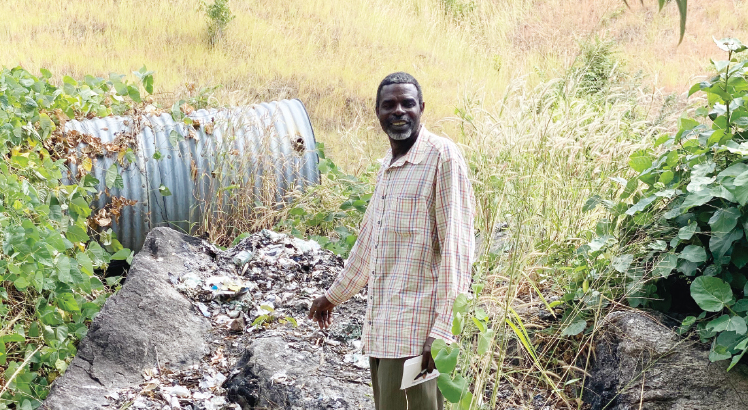Rosevelt Njeghenje, a clinical officer-in-charge of Usisya Health Centre in Nkhata Bay North, breaks down when discussing the challenges haunting the facility.
Rubbing tears, he pauses to cool off.
“This is the first time in my 26 years of service that I have experienced so many problems at a single facility,” he says.
Njeghenje arrived at Usisya in 2017. The hard-to-reach health facility is located on a rocky, camera-ready gulf of Lake Malawi.
It has no functional toilets. No incinerator. No water. No ambulance.
Mhone at a filthy spot where health workers burn hospital waste in the open
Shortages of essential drugs are common. The main losers include patients of sexually transmitted Infections (STIs), asthma and bacterial infections requiring antibiotics.
Gentamycin, a critical drug for STIs, is often in short supply on the stunning shoreline spot where fishing and tourism expand a risky sexual web.
Sadly, the area at the end of a twisting, rugged earth road from Mzuzu has no private clinics or drugstores where patients can buy prescribed drugs.
Well-off patients leaving the public facility empty-handed send their friends and relatives to buy the drugs from drugstores in Mzuzu, about 67 kilometres away.
This depresses Njeghenje and the population of 17 600, currently at risk of dying from treatable conditions due to shortages of essential medicines.
Without an incinerator, health workers dump medical waste into a pit to burn. Some children from nearby homesteads pick hospital waste, including used syringes and gloves, at their own peril.
“This fuels air pollution and exposes them and their communities to possible infections,” Njeghenje explains.
Rains wash some hospital waste into a nearby stream where health workers, patients, guardians and surrounding communities draw drinking water when taps run dry.
The health worker recounts: “The taps sometimes dry up for two weeks.
“Although the water from the stream is dirty, the dry taps leave us with no safe alternative. The facility would be closed if Medical Council of Malawi officials came today.”
Every day, patients and guardians who rely on the facility defeacate and urinate in the nearby bush.
From there, rains wash the human excreta into the contaminated stream that flows into Lake Malawi.
Ironically, most Usisya residents drink water from the lake, increasing the risk of waterbourne sanitation-related diseases that haunt over half of outpatients in the country, according to the Ministry of Health.
The breakdown in water, sanitation and hygiene (Wash) fuels the spread of diseases, especially diarrhoea.
Sick and tired of the challenges, Usisya residents requested Temwa to close the Wash gaps at the health facility.
The charity, which runs Wash projects in the remote area, has pledged to repair the facility’s water pump, construct 10 toilets and an incinerator in partnership with Nkhata Bay District Health Office.
However, the hospital requires at least 20 toilets, says Usisya health management committee vice-chairperson Godrick Mhone.
Temwa programmes officer Kondwani Botha says the request follows rising awareness of the importance of Wash for environmental and human health.
“The community is worried that as household sanitation and hygiene are improving, the Wash breakdown at the health facility keeps spreading diseases to the communities,” he explains.
Households get water filters from Temwa at a subsidised price and the charity uses the money for community projects of their choice.
Mhone says the lakeside health centre is plagued by low funding.
He explains: “This forces the committee and the community to community members to contribute funds for mops, soap and other essentials for the health centre operating without water, toilets and other essential resources. Apart from all the challenges, the hospital is understaffed,” he says.
Mary Kuwali, Area Development Committee chairperson in Traditional Authority Mbwana, says the hospital requires greater funding.
“It is a pity that we ask women from the communities to fetch water from the stream for hospital operations, including maternity services. Some boycott this voluntary work when it matters most,” she explains.
Just like that, a government-owned facility is being reduced to a super-spreader of the disease it was established of treat.
The post Usisya Health Centre cries appeared first on The Nation Online.
 Moni Malawi
Moni Malawi 

